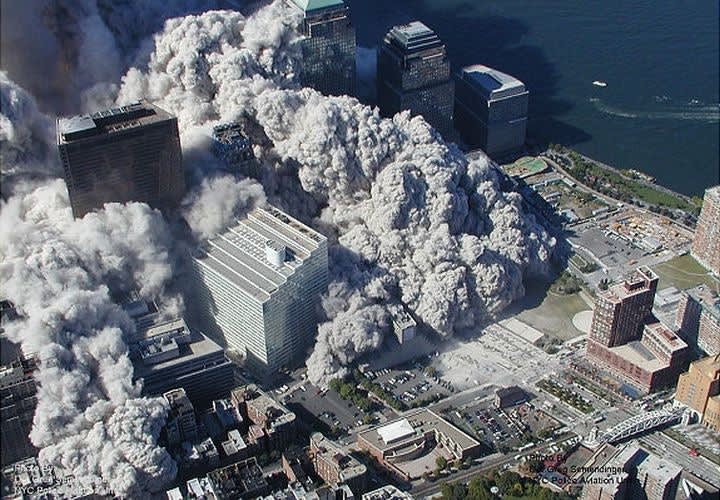"Never forget." These are the undying words that memorialize our pledge to honor the ultimate sacrifice of 72 law enforcement officers who were taken from us on Sept. 11, 2001. Last month we marked the 11th commemoration of the 9/11 attacks on our homeland. While there wasn't much news media or Hollywood interest in the anniversary, that didn't impact or diminish our commitment to honoring the memory of our fallen heroes. Fortunately, the passage of the James Zadroga 9/11 Health and Compensation Act of 2010 codified our country's commitment to support our fallen and surviving heroes of that terrible day.
On Jan. 2, 2011, the James Zadroga 9/11 Health and Compensation Act of 2010 was passed into law. This critically important legislation established the means to provide continued screening and treatment for 9/11 first responders. Unfortunately, it did not immediately provide for medical coverage and compensation for first responders who were stricken, or will be stricken, by cancers associated with prolonged exposure to 9/11 toxins at Ground "Hero."
But thanks to the sustained advocacy of law enforcement organizations and a select few elected officials, the wellness of our heroes will not get fatally stuck in the unforgiving red tape of a dysfunctional bureaucracy. On Feb 17, the Science/Technical Advisory Committee of the Zadroga Act World Trade Center Health Program (STAC) announced its recommendation that cancer case coverage be included under the James Zadroga 9/11 Health and Compensation Act.
STAC was tasked with evaluating medical illnesses that may have a direct nexus to our heroes' exposure to the toxins at Ground "Hero" on 9/11. While FLEOA would have preferred immediate government coverage for first responders stricken with toxin-exposure-related cancer, we're encouraged by STAC's findings, which resulted in long overdue treatment and benefits for our heroes who fell victim to the hazardous toxins of 9/11.
On June 8, Dr. John Howard, director of the National Institute for Occupational Safety and Health and the administrator of the World Trade Center Health Program, announced his position that STAC's findings be adopted. According to a press release issued by the office of Rep. Carolyn Maloney (D-N.Y.), Dr. Howard stated that "the entire set of recommendations issued by the Science/Technical Advisory Committee to provide coverage for certain types of cancer resulting from exposure to toxins released at Ground Zero" should be accepted.
Building on this positive momentum, the National Institute of Occupational Safety and Health (NIOSH) announced its recommendation on Sept. 9 that 50 forms of cancer coverage be included under the James Zadroga Act. With sustained leadership and advocacy, this policy recommendation will translate into real medical support for our heroes. Unfortunately, our government won't be able to apply retroactive medical coverage for our heroes who have succumbed to cancer since 9/11. We in the law enforcement community will nonetheless pull together to provide love and support for our fallen heroes' families and honor their ultimate sacrifice.
In addition to honoring the sacrifice of our fallen heroes, it's important to recognize those who fought, and continue to fight, for our heroes. As the president of FLEOA, it was my pleasure to work with the New York City law enforcement coalition (NYPD Commissioner Ray Kelly, the Sergeants Benevolent Association, Lieutenants Endowment Association, Captains Endowment Association, and Detectives Endowment Association) during several meetings on Capitol Hill. Chris Granberg, one of the premiere law enforcement advocates in D.C., provided great leadership as the coalition's point-man. Additionally, the National Association of Police Organizations and the National Troopers Coalition provided formidable support for the Zadroga legislation, while the Fraternal Order of Police supplied tactical air coverage.
On the Congressional front, two representatives, in particular, set aside partisan differences in their support for the Zadroga legislation: Rep. Carolyn Maloney and Rep. Peter King (R-N.Y.). While several elected officials opted to minimize the 9/11 aftermath as a New York problem, these two elected officials fought valiantly for all our heroes and their families. We are cautiously optimistic that their noble actions will create a contagion of patriotism in Congress. As the law enforcement coalition stated during meetings on the Hill, each star on our American flag is of equal importance. An attack on one star means an attack on all stars.
Related:
Passing the 9/11 Health-Care Bill
9/11 Health-Care Bill Goes Into Effect
First Responders Cheer Passage of 9/11 Health Bill












